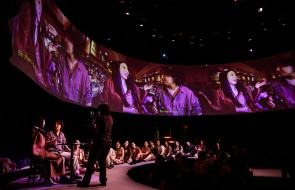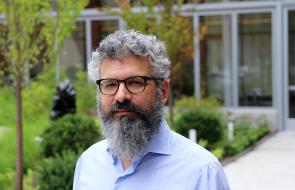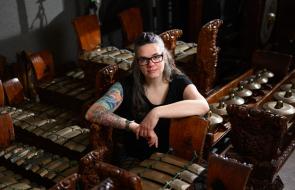Chanticleer will premiere John Harbison's Psalm 116 "I love the Lord, because he has heard the voice of my supplication." Psalm 116 was commissioned for Chanticleerin 2017 by the Frank H. and Eva B. Buck Founddation, Robert Walker, Executive Director.
Saturday, June 3 & Sunday, June 11 | St. Mark's Lutheran Church, San Francisco, CA
Sunday, June 4 | St. Francis of Assisi Church, Sacramento, CA Tuesday, June 6 | Mission Santa Clara, Santa Clara, CA
Wednesday, June 7 | First Presbyterian Church, Berkeley, CA
Saturday, June 10 | St. Stephen’s Church, Belvedere, CA
Cortez Mitchell, Gerrod Pagenkopf, Kory Reid, Alan Reinhardt, Logan Shields, Adam Ward – countertenor
Chris Albanese, Brian Hinman, Andrew Van Allsburg – tenor
Eric Alatorre, Matthew Knickman, Marques Jerrell Ruff – baritone and bass
William Fred Scott – Music Director
Psalm 116 – John Harbison (b. 1938)
Like Virgil Thomson, John Harbison is a “Harvard man.” He is also a passionate admirer of the music of Stravinsky. As a matter of fact, in Harbison’s published biography he cites his most important influences as “the Bach Cantatas, Stravinsky (whom he met in Santa Fe in 1963) and jazz.” As Harbison approaches his eightieth birthday, Chanticleer approaches its fortieth. We are honored to present our first work from this inventive and expressive American composer.
Harbison’s catalogue is noted for its variety and depth. He has written six symphonies, twelve concerti, a ballet, five string quartets, three operas and numerous song cycles and chamber works. (At about the same time that Chanticleer was giving its very first concert, the San Francisco Opera Center was mounting a production of Harbison’s first opera, The Winter’s Tale.) Four large church cantatas and ten a cappella motets are part of his ongoing involvement with sacred music, along with the large-scale works Four Psalms, written for the 50th anniversary of Israel’s statehood, and his Requiem, commissioned by the Boston Symphony.
Psalm 116 is of considerable size although it is by no means the longest of the 150 psalms. In the King James Version (which is sung here) the “poem” is divided into nineteen stanzas. Harbison’s setting divides itself into two large sections, each approximately 250 measures in length. The psalm begins with a cry of gratitude from a soul who has been acquainted with “the sorrows of death” and the “pains of Hell.” The music begins with its own fifty-bar statement of gratitude, starting with forte chords, “I love the Lord” but finishing with a quiet octave leap as the sentence concludes, “because He hath heard my voice and my supplication.” From this point the psalm text revolves around contrasts of tranquility versus agitation, tension and relief, private meditation as opposed to public declaration.
Harbison’s music also revolves around compositional tensions and contrasts. Homophonic, choral (for lack of a better word) utterances give way to imitative, canonic counterpoint. Individual solos begin to leap out from the texture (“Gracious is the Lord”) as ostinato passages of three and four-voice chords serve as anchor. Passages of intense syncopation and verve give way to contemplative sighing. The sentence, “All men are liars!” is delivered in an intense, agitated stage whisper while “I will take the cup of salvation and call upon the name of the Lord” is a slow-moving, darkly sweet chorale. There is even a short “mad scene” for solo soprano, in which Harbison has amplified the text to read, “O Lord, truly I am thy servant and the son of thy handmaid. Thou hast loosed, loosed, loosed, loosed, loosed my bonds!” Public? Private? Anguish? Charismatic, repetitive, perhaps demonic joy? The composer, as he has done throughout this work, calls upon all the compositional tricks of trade and makes all combinations possible. The “poem” ends with the exhortation, “Praise ye the Lord. The music ends more insistently, with a single word. “Praise!”
I love the Lord, because he hath heard my voice and my supplications.
Because he hath inclined his ear unto me, therefore will I call upon him as long as I live.
The sorrows of death compassed me, and the pains of Hell gat hold upon me: I found trouble and sorrow.
Then called I upon the name of the Lord; O Lord, I beseech thee, deliver my soul.
Gracious is the Lord, and righteous; yea, our God is merciful.
The Lord preserveth the simple: I was brought low, and he helped me.
Return unto thy rest, O my soul; for the Lord hath dealt bountifully with thee.
For thou hast delivered my soul from death, mine eyes from tears, and my feet from falling.
I will walk before the Lord in the land of the living.
I believed, therefore have I spoken: I was greatly afflicted:
I said in my haste, All men are liars.
What shall I render unto the Lord for all his benefits toward me?
I will take the cup of salvation, and call upon the name of the Lord.
I will pay my vows unto the Lord now in the presence of all his people.
Precious in the sight of the Lord is the death of his saints.
O Lord, truly I am thy servant; I am thy servant, and the son of thine handmaid: thou hast loosed my bonds.
I will offer to thee the sacrifice of thanksgiving, and will call upon the name of the Lord.
I will pay my vows unto the Lord now in the presence of all his people.
In the courts of the Lord’s house, in the midst of thee, O Jerusalem.
Praise ye the Lord.




